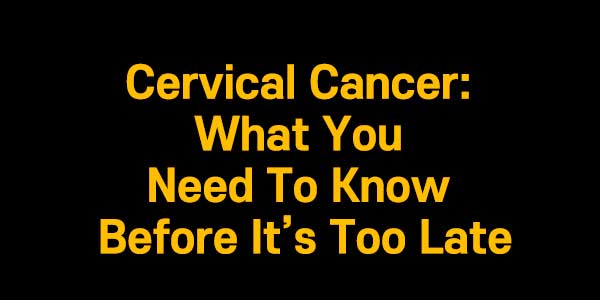
Ever skipped a Pap smear because you were “too busy”? Or ignored spotting between periods? You’re not alone — but these signs may matter more than you think. 🚨
Hey there, beautiful souls 💕 Let’s take a moment to talk about something incredibly important — cervical cancer. It’s not just a “women’s issue.” It’s a global concern, and yet many of us don’t talk about it enough. Whether you’ve been dodging your routine Pap test or just want to understand what’s going on down there — this post is for you. We’re going to dive deep into symptoms, causes, treatments, foods that help (and hurt), and daily prevention you can start right now. No shame. No fear. Just real talk. Let's go 👣
📋 Table of Contents
What Is Cervical Cancer?
Cervical cancer starts in the cervix — the lower part of the uterus that connects to the vagina. It’s slow-growing and often preventable, which makes screening super important. Most cervical cancers are caused by persistent infection with high-risk types of human papillomavirus (HPV). The scary part? You can have it for years without knowing. But here’s the good news — regular Pap tests and HPV vaccinations have made it more preventable than ever. 💪
Early Warning Signs
| Symptom | Description |
|---|---|
| Unusual Bleeding | Bleeding between periods, after sex, or after menopause |
| Pain During Sex | May signal inflammation or tumor growth on the cervix |
| Unusual Vaginal Discharge | Watery, foul-smelling, or tinged with blood |
| Pelvic Pain | Especially if it's persistent or unrelated to your period |
Main Causes & Risk Factors
HPV infection is the #1 cause of cervical cancer, especially types 16 and 18. But not everyone with HPV gets cancer — your immune system usually clears it. However, other risk factors like smoking, weakened immunity, multiple childbirths, long-term birth control use, or a lack of routine screening can tip the scale. Starting sexual activity at a young age or having many partners also increases your HPV exposure risk. Knowledge = power. Protect yourself with this info and share it with your girlfriends 💖
Available Treatments
Treatment varies by stage and personal health. For early stages, surgery is often enough — this could be a cone biopsy or hysterectomy. In more advanced stages, doctors may recommend radiation or chemotherapy. Targeted therapy and immunotherapy are becoming more common, especially for recurring cases. You’re not alone in this — modern medicine offers more options than ever, and support groups are out there for every step of the journey 💕
Helpful & Harmful Foods 🍎
| Eat More Of | Avoid These |
|---|---|
| Carrots, sweet potatoes (beta-carotene power!) | Processed meats, like bacon or sausage |
| Cruciferous veggies: broccoli, kale, cauliflower | Excessive alcohol and sugary drinks |
| Green tea & turmeric (natural anti-inflammatory) | Refined carbs like white bread and pasta |
Simple Prevention Tips 💡
- 💉 Get the HPV vaccine — it’s a game-changer and safe
- 👩⚕️ Schedule regular Pap smears and HPV tests
- 🚭 Quit smoking — it weakens your cervical cells' defenses
- 🧘♀️ Manage stress — it supports immune health
- 💧 Eat clean, sleep well, and keep your body moving
Is cervical cancer caused by HPV?
Yes, almost all cases of cervical cancer are linked to persistent HPV infections — especially high-risk types like 16 and 18.
Can I prevent it completely?
With the HPV vaccine and regular screenings, the risk drops significantly. It’s one of the most preventable cancers today!
Does cervical cancer hurt?
Early stages usually don't cause pain. As it progresses, you might feel pelvic pain or discomfort during intercourse.
Can men get HPV?
Absolutely. Men can carry and transmit HPV without symptoms, so vaccination helps protect everyone!
What age should I get vaccinated?
The ideal age is 11–12, but it’s approved up to 45. If you missed it young, it's still worth asking your doctor about it!
How often should I get a Pap test?
Every 3 years for women 21–29, and every 5 years with HPV co-testing for ages 30–65 — unless your doctor says otherwise.
Thank you for staying with me through this essential guide 🌼 I know topics like cervical cancer can feel heavy, but knowledge really is power. If you’re reading this, it means you care — for yourself, your health, and probably for the people you love too. Let’s keep spreading awareness, encouraging each other to get checked, and living our healthiest, strongest lives possible 💛 Drop a comment if you’ve had experience with HPV or Pap tests — your story could help someone else!
cervical cancer, HPV, women's health, pap smear, abnormal bleeding, HPV vaccine, pelvic pain, cancer prevention, gynecologic health, cervical screening